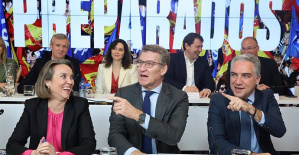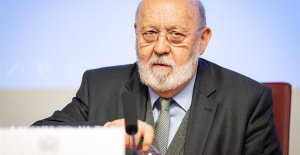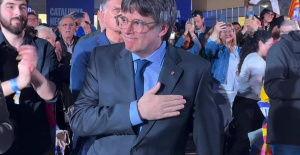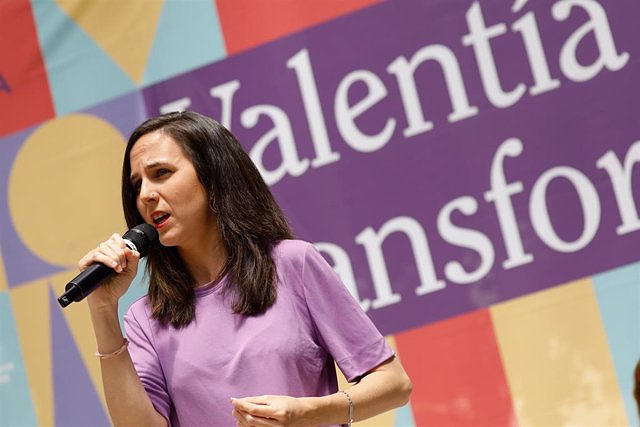The national leadership has sent its candidates in Madrid the general assessment of the 28M elections
Podemos once again suffers the electoral bleeding that the political formation has been suffering in the last few appointments with the polls, a setback that has been particularly accentuated this Sunday, May 28, with the regional elections, with the loss of all its territorial power, being left out of Madrid and the Valencian Community, and in the municipalities, where Ada Colau does not retain the baton of command in Barcelona. Those of Ione Belarra went to the elections with a record of unit candidacies with Izquierda Unida which, however, have not served to increase the number of support among the electorate.
Once again, the purple formation once again shows its territorial weakness, one of the party's problems since the 2019 elections, and will arrive weakened at the regrouping process of the left promoted by Sumar, the platform led by the second vice president, Yolanda Díaz. The electoral failure has led the national leadership to leave the general assessment of the 28M results to the Madrid candidates, Roberto Sotomayor and Alejandra Jacinto, who is also a co-spokesperson for the party.
Podemos and Izquierda Unida went together in ten of twelve autonomies, with the exception of Asturias and Aragón, where there was no unity agreement. Despite this, the minority partner of the central government has regressed its territorial power in all the autonomous communities, without being able to form alternative majorities with the PSOE to govern and, even, losing four autonomous executives that co-governed (Aragon, Valencian Community, the Canary Islands and the Balearic Islands ). It could only be maintained in that of Navarra, in the event that the socialist María Chivite reissued the 2019 pact. Specifically, they have gone from 47 regional deputies in 2019 to 15 parliamentarians in these elections.
In fact, it has disappeared at the territorial level in two important places, the Community of Madrid and the Valencian Community, which they considered key to stopping majorities of the PP or influencing future governments. Nor have they reached their goal of entering the regional parliaments of Castilla-La Mancha and Cantabria and have also been left out of the Canary Islands, where they shared a coalition with the socialist Ángel Víctor Torres.
In the first region, the victory of the 'popular' Isabel Díaz Ayuso and the push of Más Madrid has expelled Podemos and IU from the Assembly, by losing the ten seats it obtained in 2021 with Pablo Iglesias as candidate, while in the Second, where Héctor Illueca was part of the 'Botànic' government together with PSOE and Compromís, he was left out of the Valencian Parliament, without managing to retain the eight deputies from the previous elections.
In addition, in the rest of the autonomies, the 'purples' worsen their latest results. In Asturias, Podemos plummeted from four to only one representative in the Principality's General Meeting and IU, under the brand 'Call with Asturias', improved from two to three seats.
The situation in Aragon is no better, where both formations also presented themselves separately, and only achieved one deputy each. With a single representative, Unides Podem was also formed in the Balearic Islands, of the six it achieved in 2019.
The best results for Podemos and Izquierda Unida were in Extremadura, where they hold four seats in the Assembly; in the Region of Murcia, where they also retain two parliamentarians, the same as four years ago; as is the case in La Rioja, with two deputies who are not enough to join the PSOE. In Navarra, both formations, framed under the brand 'Contigo Navarra, obtained three seats.
CRASH IN CITIES
The debacle of Podemos and Izquierda Unida, which came together in 39 of 52 provincial capitals, has also been pronounced in the country's large cities. The national leadership has turned to the candidate for mayor of Madrid for the formation to enter the Madrid consistory and thwart a comfortable victory for José Luis Martínez-Almeida.
Finally, the PP has swept away an absolute majority, while Roberto Sotomayor is left with zero councilors. Something similar is happening in Valencia, where Podemos was already extra-parlementary and now, in the 2023 elections, it is also unable to represent Pilar Lima.
In Barcelona, the debacle has evicted Ada Colau from the Barcelona City Council, falling from ten to nine councilors, but falling to third position behind Jaume Collboni and Xavier Trias, the most voted. In this way, the 'comunes' lose their jewel in the crown, one of the places where the second vice president and leader of 'Sumar', Yolanda Díaz, was most involved in her electoral campaign.
Podemos also disappears in Zaragoza, by not achieving any councilor compared to the two that it achieved in 2019, and Izquierda Unida, which presented itself separately from the formation in the Aragonese capital with the brand 'Zaragoza in common', drops from three to two aediles In Murcia, the purple formation remains extra-parliamentary against the majority of PP.
In Seville, despite the fact that Podemos and IU competed under the 'Con Andalucía' brand along with six other formations, including Más País, they have achieved two councilors compared to the four that they obtained in the 2019 elections, to which they were joined together with Go ahead, and they do not reach a majority with the PSOE. In the other great Andalusian capital, Malaga, where there was also a unity candidacy, they have fallen from three to two mayors.
Worse is the situation in Cádiz, with Podemos without getting any councilor in the city council. The 'purples' got off the hook at the last moment of an agreement with Adelante and IU, which also fails to retain the power that José María González 'Kichi' held since 2015, and loses more than half of the councilors it achieved in 2019 (they pass from 13 to six).
WITHOUT REMOVING SINCE 2019
The current confederal space deepens its negative spiral that began in 2019, where it lost a good part of its regional and local representation with which it burst into the political landscape in 2015. Then he achieved his best historical results in this electoral event, when he entered with force in the main regional parliaments and even managed, by sponsoring municipal candidacies, to govern in the consistories of Madrid, Zaragoza or A Coruña, the so-called 'change councils'.
Already in the 2019 general elections, Unidas Podemos experienced, although in a more contained way, an electoral collapse by losing half of its seats (from 71 in 2016 to 35 from 10N), results that, however, alleviated when entering in the Government with the PSOE. However, the coalition of Podemos and IU left more than 1.9 million voters by the wayside with respect to the 2016 national elections.
However, in 2020 it suffered another severe electoral blow by being left out of the Galician Parliament and a severe decline in the Basque Country, where it halved its representation (from 11 to 6 parliamentarians). In the 2021 Madrid elections, the purple formation and IU improved their results with former vice president Pablo Iglesias as a candidate, rising from 7 to 10 seats, but did not meet the objective of being decisive to avoid the resounding victory of the 'popular' Isabel Díaz Ayuso, for which the former leader of Podemos submitted his resignation the same election night.
In Castilla y León, with the electoral advance, both formations also suffered a setback by being left with only one deputy and the last Andalusians last year, with the broad front experiment of Podemos, IU and Más País (with the coalition 'For Andalusia ') failed to harvest only five deputies without preventing the absolute majority of Juanma Moreno (PP). The only parenthesis in this trend were the 2021 Catalan regional elections, which the socialist Salvador Illa won and where the 'commons' managed to retain their eight deputies.

 Exploring Cardano: Inner Workings and Advantages of this Cryptocurrency
Exploring Cardano: Inner Workings and Advantages of this Cryptocurrency Seville.- Economy.- Innova.- STSA inaugurates its new painting and sealing hangar in San Pablo, for 18 million
Seville.- Economy.- Innova.- STSA inaugurates its new painting and sealing hangar in San Pablo, for 18 million Innova.- More than 300 volunteers join the Andalucía Compromiso Digital network in one month to facilitate access to ICT
Innova.- More than 300 volunteers join the Andalucía Compromiso Digital network in one month to facilitate access to ICT Innova.-AMP.- Ayesa acquires 51% of Sadiel, which will create new technological engineering products and expand markets
Innova.-AMP.- Ayesa acquires 51% of Sadiel, which will create new technological engineering products and expand markets The PP sees the concentration of support for Sánchez in Ferraz as a "failure" and believes that it "complicates" the story of its continuity
The PP sees the concentration of support for Sánchez in Ferraz as a "failure" and believes that it "complicates" the story of its continuity Marc Márquez returns to pole in Jerez
Marc Márquez returns to pole in Jerez The CIS carries out a quick survey on Sánchez's letter to measure the reaction of citizens
The CIS carries out a quick survey on Sánchez's letter to measure the reaction of citizens 12M.- Puigdemont to Sánchez and Illa: "This is not about the future of the PSOE! What have you believed?"
12M.- Puigdemont to Sánchez and Illa: "This is not about the future of the PSOE! What have you believed?" How Blockchain in being used to shape the future
How Blockchain in being used to shape the future Not just BTC and ETH: Here Are Some More Interesting Coins Worth Focusing on
Not just BTC and ETH: Here Are Some More Interesting Coins Worth Focusing on UPV students build a prototype of a wooden house to move to Equatorial Guinea
UPV students build a prototype of a wooden house to move to Equatorial Guinea The UA opens the call for the Impulso 2024 Awards for the best innovative business initiatives
The UA opens the call for the Impulso 2024 Awards for the best innovative business initiatives ALI, virtual assistant from Alicante, internationally recognized by the OECD
ALI, virtual assistant from Alicante, internationally recognized by the OECD Retrópolis brings the golden age of video games and computing to the UPV
Retrópolis brings the golden age of video games and computing to the UPV A million people demonstrate in France against Macron's pension reform
A million people demonstrate in France against Macron's pension reform Russia launches several missiles against "critical infrastructure" in the city of Zaporizhia
Russia launches several missiles against "critical infrastructure" in the city of Zaporizhia A "procession" remembers the dead of the Calabria shipwreck as bodies continue to wash up on the shore
A "procession" remembers the dead of the Calabria shipwreck as bodies continue to wash up on the shore Prison sentences handed down for three prominent Hong Kong pro-democracy activists
Prison sentences handed down for three prominent Hong Kong pro-democracy activists ETH continues to leave trading platforms, Ethereum balance on exchanges lowest in 3 years
ETH continues to leave trading platforms, Ethereum balance on exchanges lowest in 3 years Investors invest $450 million in Consensys, Ethereum incubator now valued at $7 billion
Investors invest $450 million in Consensys, Ethereum incubator now valued at $7 billion Alchemy Integrates Ethereum L2 Product Starknet to Enhance Web3 Scalability at a Price 100x Lower Than L1 Fees
Alchemy Integrates Ethereum L2 Product Starknet to Enhance Web3 Scalability at a Price 100x Lower Than L1 Fees Mining Report: Bitcoin's Electricity Consumption Declines by 25% in Q1 2022
Mining Report: Bitcoin's Electricity Consumption Declines by 25% in Q1 2022 Oil-to-Bitcoin Mining Firm Crusoe Energy Systems Raised $505 Million
Oil-to-Bitcoin Mining Firm Crusoe Energy Systems Raised $505 Million Microbt reveals the latest Bitcoin mining rigs -- Machines produce up to 126 TH/s with custom 5nm chip design
Microbt reveals the latest Bitcoin mining rigs -- Machines produce up to 126 TH/s with custom 5nm chip design Bitcoin's Mining Difficulty Hits a Lifetime High, With More Than 90% of BTC Supply Issued
Bitcoin's Mining Difficulty Hits a Lifetime High, With More Than 90% of BTC Supply Issued The Biggest Movers are Near, EOS, and RUNE during Friday's Selloff
The Biggest Movers are Near, EOS, and RUNE during Friday's Selloff Global Markets Spooked by a Hawkish Fed and Covid, Stocks and Crypto Gain After Musk Buys Twitter
Global Markets Spooked by a Hawkish Fed and Covid, Stocks and Crypto Gain After Musk Buys Twitter Bitso to offset carbon emissions from the Trading Platform's ERC20, ETH, and BTC Transactions
Bitso to offset carbon emissions from the Trading Platform's ERC20, ETH, and BTC Transactions Draftkings Announces 2022 College Hoops NFT Selection for March Madness
Draftkings Announces 2022 College Hoops NFT Selection for March Madness























